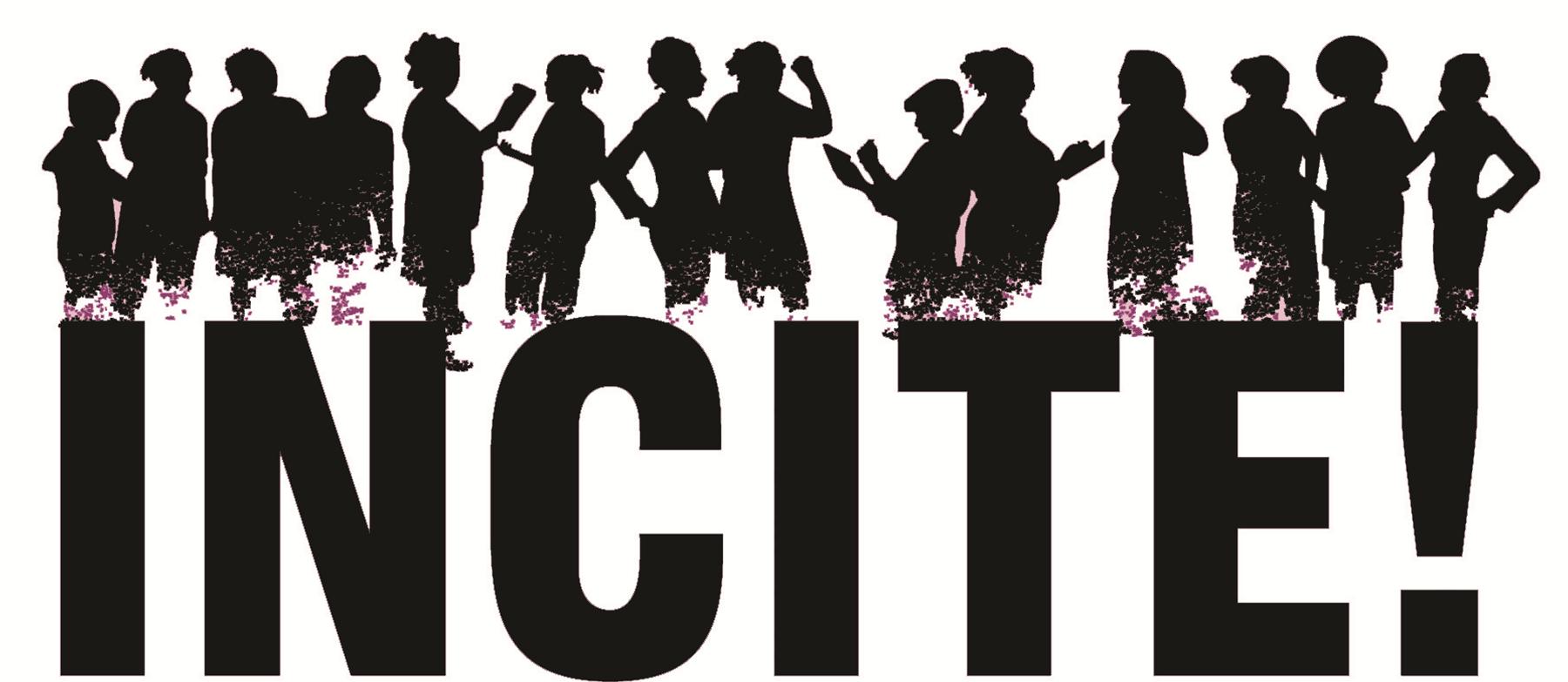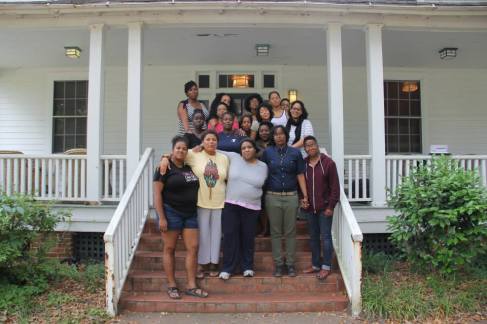Getting Free Down By The Combahee Riverside: A Black Feminist Pilgrimage
by Amber Williams
On June 2nd 1863 Harriet Tubman positioned herself as the first woman to serve as a military operative for the United States Union Army to coordinate and execute the Combahee River Raid during the Civil War. She arrived in South Carolina with the intention of “tearing shit up”(Alexis Gumbs) burning the residences and property of seven to eight plantations and freeing approximately 800 (and potentially more) enslaved people in one night—this number more than quadrupling the amount of people she freed at this point in her career.
Fast-forwarding to May 31, 2013, I participated in the Combahee River Black Feminist Pilgrimage, a component of Mobile Homecoming and Eternal Summer of the Black Feminist Mind gathering to honor Harriet Tubman and the 150th year anniversary of the Combahee River Raid. I assumed my participation in this pilgrimage I would a: help me realize a greater sense of purpose in anti-oppression work and b: allow me to engage in scholarly dialogue about black feminist paradigms and how they manifest in the lives of Black feminist queer women, trans and gender nonconforming people. Although these presumptions were elements of my experience, they were most certainly reductive components of an entire sum—and the total sum went beyond my presumption I could ever imagine as “transcendent”.
Honestly, my willingness to be open to transformation was by no means a part of my experience before arriving. Even after being overwhelmed by a wave of excitement and joy upon receipt of the knowledge that I could in fact attend this pilgrimage, life took a few dramatic twists and turns that forced me to reconcile what it means to exist as a black queer woman torn in utter disarray about my responsibility to my family; unsettled about intimate relationships; and hurting from the manifestations of capitalism playing tricks on my wallet, all while uncovering repressed trauma that questioned my sense of place and belonging at home . Long story short, I had an inescapable ‘bad attitude’ with very little refuge to uncover the roots. Therefore I questioned the value of my bad attitude at a pilgrimage that may require a more upbeat, energetic persona I felt unable to provide. I wondered how I could be fully present while balancing my reality as a black queer woman disrupted by so many forces in my emotional turmoil and depletion of energy.
With the wisdom, kindness, and patience of family, friends, and mentors, I packed my worries alongside my journal and decided to immerse myself into the unknown beauty of this pilgrimage with all my warranted and unwarranted anxieties. I hoped to find answers to pressing questions that could help me shift my environment in a more self-determined direction. With all of my material and emotional baggage, I finally arrived at the first meeting point of the pilgrimage, still clamoring for some control by micromanaging of transportation and being hyper-concerned about tardiness, only to finally fall into a place surrounded by the beautiful faces of the black women who immediately put my worries at ease. I was instantly comforted up by their energy in a way that mellowed my hovering stress. In that calming moment I knew that I had been called by the universe and my ancestors to be there; caravanning between North and South Carolina, unveiled in the rawness of my essence; eventually, sailing along the Harriet Tubman Freeway while exchanging dried mango, lavender lemonade, kale salad, and “queer (vegan and gluten free) chicken” in the epic novelty of unquestioned closeness and acceptance of everyone. We danced and sang in our seats, reflected on the words of our pilgrimage podcast and dialogued about love, relationships, gender expression, healing, spirituality, nourishment, and autonomy as we journeyed to the Penn Center the location of the duration of the pilgrimage
Upon our arrival, that night, we set our intentions, shared each of our purpose for coming, expressed what we needed from each other for the remainder of our time, and listened to a general overview of why we were gathering. Immediately, what I presumed to be strictly a dialogue space to honor the Combahee River Collective Statement and the fierce legacy of its creators was challenged by a deep understanding of the relevance of the Combahee River and a re-introduction to Harriet Tubman.
Alexis Gumbs hoped this would be a time to evaluate what we are getting free of and intended to leave behind at the river…keeping in mind the infamous imagery of Harriet Tubman’s shot gun symbolizing the promise and commitment of follow through from freeing ourselves from the pits of colonization and capitalist forces manifested from chattel slavery.
I felt called to evaluate the complexity of being mentally, emotionally, spiritually, and intellectuality imprisoned by capitalism, sexism, and racism (just to name a few) while simultaneously recognizing that our very existence is a manifestation of Harriet Tubman’s dream of the abolishment of chattel slavery. I felt accountable to honoring the innumerous sacrifices made through varying forms of resistance by enslaved and freed black folk in order to make it possible for me to be able to say and proclaim “I am” and “I choose”. Resting in this complexity of freedom made it possible for me to celebrate the triumphs of Harriet Tubman and other Black women freedom fighters, both past and present. I remembered my ‘bad attitude’ and all of the other repressed traumas and challenges in my world that in a twisted convoluted way lead me to the River. My tired and stressed body and spirit needed to be in a state of depletion in order for me to unleash any sense of reservation that would stop me from harboring unexamined internalized oppression. I thought about Harriet’s journey to South Carolina and wondered how angry, frustrated, and fed up she must have been in order to coordinate a violent revolt against chattel slavery freeing hundreds of people. Thus, my participation in this pilgrimage surrounded by my unraveling context felt much bigger than a mere coincidence. I chanted, journeyed, sang, and danced in strength and love in full recognition that “black women are inherently valuable” (Combahee River Collective Statement).
Together in celebration of black magic, black queerness, black love, and black resistance, we found ways to extract the deepest internalizations of our multiple and intersecting oppressions, mark their transient patterns between our distanced experiences, and dismantle them through the embodied realization that “the only people who care enough about us to work consistently for our liberation are us” (Combahee River Collective Statement). We “laid down our varying and interwoven burdens” premised on a collective agreement that “our ancestors worked tirelessly to prove themselves so that we did not have to” (Combahee Pilgrimage Member) and that honoring them meant abolishing the shackles of our contexts as an act of self-love. With my heart, body, and spirit stretched wide open, I felt held, loved, beautiful, and awakened by the presence of my newfound community of women who were so willing to “know” me, to see me, and to be seen in their vulnerabilities. As we interlocked our stories like oak trees strengthened by the outward grasps of sprawling fringed and loosened roots in love and solidarity, I reconnected to an un-institutionalized form of black spirituality by singing black hymnals and dancing proudly to freedom fighter songs (sometimes) in tears; and in those precious moments I could relinquish any fear of compromising my strength (a consequence and tool in navigating the complexities of my intersecting identities) through an expression of vulnerability and weakness. I didn’t have to navigate the world wandering in silent despair; I could instead stay up late into the night gazing at clear blue skies filled with bright stars for endless hours while being fed and filled with dialogue, understanding, and care. And none of the questions I came seeking answers for were answered in my oasis. Yet I felt ready and rejuvenated to return to Ann Arbor with an awakened spirit packed with even more unanswered questions. Four days at a Black Feminist Pilgrimage and hours spent in meditation at the Combahee River served as a reminder that my ‘freedom’ from deep internalizations of colonization, (in many ways) requires an aggressive unshackling of self-hate, doubt, and degradation in the company and occupation of a black queer feminist collective of beautiful people ready and willing to hold me, as I hold them, in loud, bolstering resistance.
To end this reflection: Thank you to my Incite! Ann Arbor family and Incite! Nationals for informing me of this completely transformative experience and a very, very special shout out to Karla Meija, Kiri Sailiata, Isabel Milan, Alexis Gumbs, and Mandisa Moore for your creative organizing that made it possible for me to participate in this pilgrimage. Words cannot express my gratitude, love and appreciation for your support. I also want to thank Dr. Sheri Randolph, African and African American History Professor at the University of Michigan-Ann Arbor—an amazing scholar who catalyzed my intellectual juices by introducing me to black feminist scholarship. Dr. Randolph, you developed a landscape in which I was able to imagine and actualize myself in a way that no academic course ever could. I am eternally grateful.
In Love and Solidarity
Amber
Amber Williams is a program coordinator at the University of Michigan in the Division of Student Affairs, and advocate of educational equity engaged in tackling the school to prison pipeline, college access for first generation youth in urban/rural Michigan, and supporting queer youth of color empowerment projects by leveraging university resources. She has also been a member Incite! Ann Arbor/Ypsilanti chapter for five years as a facilitator and organizer of social justice education through a black feminist praxis and ideology.



Recent Comments